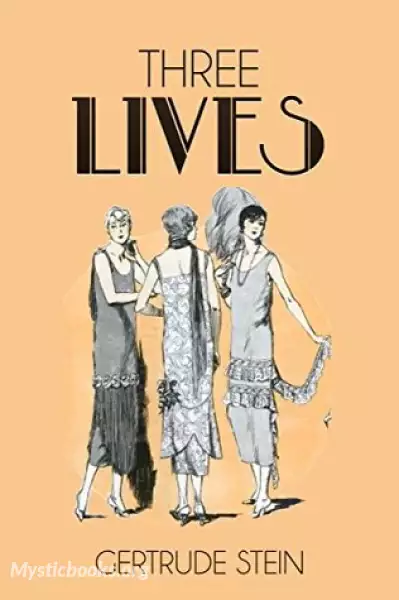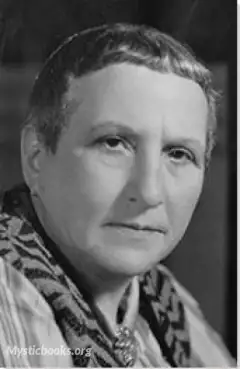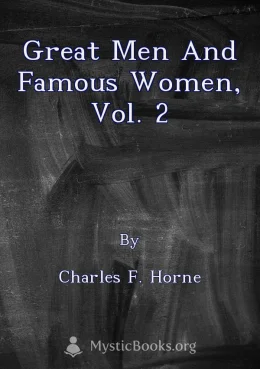
Three Lives
'Three Lives' Summary
"donc je suis un malheureux et ce n’est ni ma faute ni celle de la vie"
"therefore, I am unhappy and this is neither my fault nor that of my life"
— Jules Laforgue, quoted as epigraph to Three Lives
Each of the three tales in Three Lives tells of a working-class woman living in Baltimore.
"The Good Anna"
"The Good Anna," the first of Gertrude Stein’s Three Lives, is a novella set in "Bridgepoint" about Anna Federner, a servant of "solid lower middle-class south german stock."
Part I describes Anna’s happy life as housekeeper for Miss Mathilda and her difficulties with unreliable under servants and "stray dogs and cats". She loves her "regular dogs": Baby, an old, blind, terrier; "bad Peter," loud and cowardly; and "the fluffy little Rags." Anna is the undisputed authority in the household, and in her five years with Miss Mathilda she oversees in turn four under servants: Lizzie, Molly, Katy, and Sallie. Sometimes even the lazy and benign Miss Mathilda feels rebellious under Anna’s iron hand; she is also concerned because Anna is always giving away money, and tries to protect her from her many poor friends.
Part II, "The Life of the Good Anna", fills in the background. Born in Germany, in her teens Anna emigrates to "the far South", where her mother dies of consumption. She moves to Bridgepoint near her brother, a baker, and takes charge of the household of Miss Mary Wadsmith and her young nephew and niece, who are orphans. Little Jane resists Anna’s strong will, but after Anna has provoked a showdown becomes "careful and respectful" and even gives Anna a green parrot. When after six years Jane is finally married, Anna refuses to follow Miss Mary in the new household. Mrs. Lehntman, a widow and midwife who "was the romance of Anna’s life", helps Anna tell Miss Wadsmith that she cannot accompany her. Anna then goes to work for Doctor Shonjen, a hearty bachelor, with whom she gets along. Previously Shonjen has operated on her, and Anna’s general health remains poor: she has headaches and is "thin and worn". When Mrs. Lehntman, who has two careless children, adopts a baby without consulting Anna, the latter is offended and spends more time with another large working family, the Drehtens. She also visits her brother the baker, but has trouble with her sister-in-law, though she eventually helps with her savings when her god-daughter niece is married. Mrs. Lehntman rashly decides to open a boarding house, and Anna despite her misgivings lends her the necessary money, for "Romance is the ideal in one’s life and it is very lonely living with it lost". Having been once defeated in the matter of Johnny's adoption, she can no longer impose her will in the relationship. ("In friendship, power always has its downward curve.") When Dr. Shonjen marries a "proud" and "unpleasant" woman, Anna seeks a new position. Encouraged by a fortune-teller, she goes to work for Miss Mathilda, and these are her happiest years, until finally her ailing favorite dog Baby dies and Miss Mathilda leaves permanently for Europe.
"Melanctha," the longest of the Three Lives stories, is an unconventional novella that focuses upon the distinctions between, and blending of, race, sex, gender, and female health. Stein uses a unique form of repetition to portray characters in a new way. "Melanctha", as Mark Schorer depicts it on Gale's Contemporary Authors Online, "attempts to trace the curve of a passion, its rise, its climax, its collapse, with all the shifts and modulations between dissension and reconciliation along the way". But "Melanctha" is more than one woman’s bitter experience with love; it is a representation of internal struggles and emotional battles in finding meaning and acceptance in a tumultuous world.
The main character Melanctha, who is the daughter of a black father and a mixed-race mother in segregated Bridgepoint, goes on a quest for knowledge and power, as she is dissatisfied with her role in the world. Her thirst for wisdom causes her to undergo a lifelong journey filled with unsuccessful self-fulfillment and discovery as she attaches herself to family members, lovers, and friends, each representing physical, emotional, and knowledgeable power. She visualizes herself in relation to those around her, but is consistently unable to meet their expectations. And yet, for all the colorization and gendering of the characters, color and sex are incongruent to social and romantic success. "Melanctha" depicts each of its characters in racial degrees and categories, but their fates often run counter to what readers might expect.
Thoughts of suicide are often appealing to Melanctha, who finds herself "blue" and in despair. The last betrayal and Melanctha’s final blow, her close friend Rose's rejection of her, leaves her broken and ill. At the culmination of the novella, Melanctha is consumed, not so much by the physical illness that overtakes her, as by the despair she has felt throughout her life. She has often complained of feeling "sick," of being "hurt," and of having "pain," but perhaps this physical pain has always included a deep mental pain stemming from her experiences in life. Melanctha’s death from "consumption," as tuberculosis was then widely known, concludes the story.
"The Gentle Lena", the third of Stein's Three Lives, follows the life and death of the titular Lena, a German girl brought to Bridgepoint by a cousin. Lena begins her life in America as a servant girl, but is eventually married to Herman Kreder, the son of German immigrants. Both Herman and Lena are marked by extraordinary passivity, and the marriage is essentially made in deference to the desires of their elders. During her married life, Lena bears Herman three children, all the while growing increasingly passive and distant. Neither Lena nor the baby survives her fourth pregnancy, leaving Herman "very well content now...with his three good, gentle children".
Book Details
Language
EnglishOriginal Language
EnglishPublished In
1909Authors

Gertrude Stein
United States
Stein, the youngest of a family of five children Her father was a wealthy businessman with real estate holdings. German and English were spoken in their home. Gertrude's siblings were: Michael (1865),...
Books by Gertrude SteinDownload eBooks
Listen/Download Audiobook
- Select Speed
Related books

Caroline the Illustrious, Vol. 1 by William Henry Wilkins
Caroline of Ansbach, Princess of Wales, and later Queen Consort of Great Britain, was a remarkable figure in 18th-century England. As the wife of Geor...

Life of Chopin by Franz Liszt
This memoir by Franz Liszt provides a unique insight into the life and work of his friend and fellow composer, Frédéric Chopin. Liszt discusses Chopin...

George Castriot, surnamed Scanderbeg, King of Albania, Books 1–3 by Marin Barleti
This historical account delves into the life of George Castriot, better known as Scanderbeg, a prominent figure in Albanian history. The text chronic...

Naval Pioneers of Australia by Louis Becke
This book is a history of the Australian naval pioneers, from the earliest Dutch, Spanish, and Portuguese explorers through to Captain Cook and the de...

Mendelssohn And Certain Masterworks by Herbert Francis Peyser
This book delves into the life and musical legacy of Felix Mendelssohn, a prolific composer of the Romantic era. It explores his extensive body of wor...

Jeanne D'Arc, de Maagd van Orléans by Henri Emile Koopmans van Boekeren
This book provides a historical overview of the life of Jeanne D'Arc, a young French peasant girl who led the French army to several victories during...

Book of Missionary Heroes by Basil Joseph Mathews
This book tells the stories of various missionaries throughout history who faced danger and hardship to spread Christianity around the world. The book...

Great Men and Famous Women, Vol. 2 by Charles F. Horne
This volume, part of an eight-volume series, explores the lives and achievements of prominent figures from European history. It delves into the milita...

American Idyll: The Life of Carlton H. Parker by Cornelia Stratton Parker
In "American Idyll," Cornelia Stratton Parker paints a poignant portrait of her husband, Carlton H. Parker, a prominent social reformer who dedicated...

Expressman and the Detective by Allan Pinkerton
Allan Pinkerton (1819-1884), a Scotsman by birth and a barrel-maker by trade, settled in Chicago in its infancy and founded the Pinkertons, the world'...
Reviews for Three Lives
No reviews posted or approved, yet...